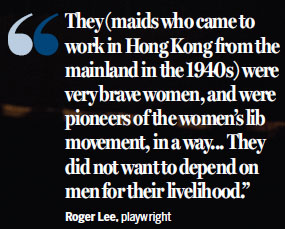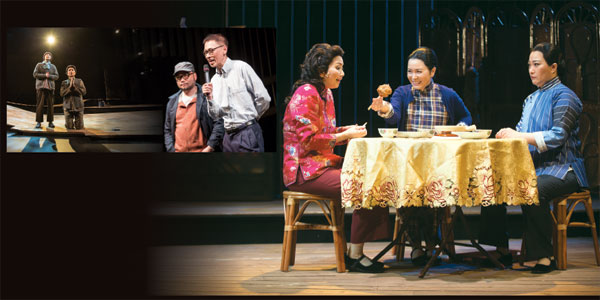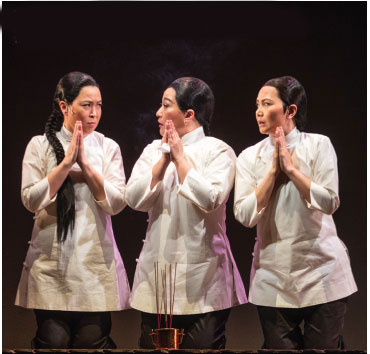Sister act
Updated: 2015-03-06 07:15
By Chitralekha Basu(HK Edition)
|
|||||||||
A new play drawing inspiration from the never-say-die attitude of HK's migrant maids celebrates the spirit of female bonding. A review by Chitralekha Basu.
The Amahs(maids), a new play produced by Hong Kong Arts Festival, debuted last weekend. The timing could not have been more appropriate, with the six-year jail term handed down Feb 27 to the Hong Kong woman who cruelly abused her Indonesian helper. The sentencing of Law Wan-tung brought renewed focus on the 330,000-strong foreign domestic helper community in Hong Kong.
Last weekend, the paved portico all around Hong Kong City Hall -where the play was staged-became the place where young migrant maids came to renew bonds of friendship. The exuberance, spilled over from Statue Square across the road, and into the auditorium, where the spirit sorority among the women, far from home; their gusto and effervescence, became a subject for art.
"These women contributed a lot to Hong Kong society," says Roger Lee, the play's co-scriptwriter. He was speaking about the domestic helpers who came from southern mainland to work in Hong Kong during the 1940s, in the immediate aftermath of China's war with Japan. "These were very brave women, and were pioneers of the women's libmovement,in a way. They left home in search of a livelihood to escape poverty and the ordeal of having to face domestic violence at home. They did not want to depend on men for their livelihood," says Lee.
Lee's engagement with the lives of migrant domestic helpers is sustained. It began with a film, scripted for director Ann Hui-A Simple Life-based on the real-life story of his relationship with an old family retainer, Tao Jie. The film starred Andy Lau as Roger, a modern film producer, and Deanie Ip as the elderly housemaid. A Simple Life became the toast of the festival circuit for its measured portrayal of bonding between two unlikely people. It won Ip the best actress award at Venice International Film Festival in 2012.
Never-ending story
The leftover research material from that film went into a two-part documentary made for Radio Television Hong Kong's Golden Age series. By the time that was over, Lee had interviewed at least 30 amahs(as they would be called by their British employers). Most of the women he talked to were well into their 80s and 90s, including one who was 99. Lee had thought of using the material to mount a small-scale stage production, but after co-scriptwriter Wong Wing-sze and director Roy Szeto came on board, and three heavyweight actors of Hong Kong stage-Alice Lau, Louisa So and Pang Hang-ying-were roped in, the script seemed to develop a life of its own, expanding into a two-and-half-hour-long play, spanning nearly 50 years of Hong Kong's social history.
The historical events, however, never loom so large as to overwhelm or shatter the three protagonists, Kim, Lan and Ho, inThe Amahs. Even as one hears of the great famine raging at home and the Hong Kong stock market crash (in which, Kim, the oldest of the amahs, loses all her savings), it's the resilienceof the maids to bounce back and take a hold on their lives in spite of the odds piled high against them, that shines through. The spirit of sisterhood and the pledge made in front of Guanyin, or the Goddess of Mercy in Buddhism, to look out for each other is carried forward to the next generation, when Lan's daughter Kimmy tends to the old and wheelchair-bound Kim, the lone surviving member of the cohort.
Too good to be true
If one must nitpick, the three main characters in the play are a bit too good to be true. They are credulous, nave, honest, sincere, ready to help a stranger in need, full of righteous rage on behalf of a fellow who has been given a raw deal, but lack the slightest trace of negativity. It's not difficult to imagine why. Lee's tremendous respect and admiration for the maids, whose lives he studied closely, comes in the way of his seeing them as anything other than family. "I was closer to them perhaps more than any woman writer would be. They trusted me. I will be a young man to them, always," he says, fondly.
The play scores in terms of giving dignity to the menial work maids do; watching them fold nappies, iron the mistress' qipaoand prepare a pot of English tea to be served to the British employer-who might say "bugger off" if unsatisfied with the brew-feels like seeing artists at work, investing the job at hand with respect and caring and striving to make it even more perfect if that were possible. The live cooking scene went down particularly well with the audience, especially when the aroma of Pomfret sauted in garlic, whipped up by Louisa So-who happens to be the host of a popular cookery show on TV-filled the auditorium.
The more things change the more they remain the same, in certain respects. The history of women being taken advantage of is repeated in the second generation when Kimmy, a qualified lawyer, is deceived by her boyfriend, much like her mother who was abandoned by her husband. It's her bonding with the now frail, but no less spirited Kim, that adds meaning to her lonely, if materially-successful, life.
Women looking out for each other can make a world of difference to their lives and the spaces they inhabit. This seems to be the message of the play as indeed it's evident in the sorority displayed on Hong Kong's streets.
Contact the writer at basu@chinadailyhk.com
|
Playwright Roger Lee and director Roy Szeto (wearing hat) talk about their craft in a post-performance interaction with the audience. provided to China Daily |
|
Louisa So, Alice Lau and Pang Hang-ying play the three amahs with great gusto and perfect comic timing. provided to China Daily |

(HK Edition 03/06/2015 page7)

